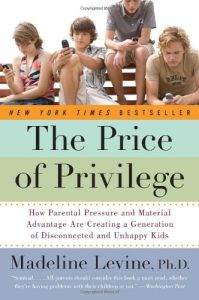
In my experience, high quality, independent test-prep firms produce some of the best college newsletters. One newsletter that I always make sure I read comes from Compass Education Group, which offers test prep in Northern and Southern California.
Today I am sharing a thought-provoking post that Matt Steiner, who is Compass Education’s marketing director, originally wrote for the test-prep firm’s blog that addresses this question:
Is there a damaging obsession with achievement among American families (with affluent parents leading the way)?
I believe that the answer to this important question is “yes.” I think, however, that affluent parents are responsible for nearly ALL of this destructive obsession. Matt’s post is definitely worth reading to the end, where you’ll find a short video from a former Ivy League professor that’s definitely worth watching!
Lynn O’Shaughnessy
‘The Price of Privilege’
By Matt Steiner
For years, I’ve noticed a common source of stress for families and staff at (primarily) private high schools in California. Many students bearing the hallmarks of success – excellent grades, extracurricular involvement, and deft interpersonal skills – are experiencing high incidences of depression and anxiety.
To make matters more confusing, these ‘high-achievers’ appear to be raised by attentive, financially stable parents with many resources at their disposal. Given the circumstances, shouldn’t these hard-working teens experience the greatest amounts of happiness?
The paradox of the deeply troubled, highly privileged teen forms the crux of Dr. Madeline Levine’s critically acclaimed book, The Price of Privilege: How Parental Pressure and Material Advantage Are Creating a Generation of Disconnected and Unhappy Kids. After seeing Levine give a presentation at a college counseling conference earlier this year, I picked up a copy of her book and quickly tore through it. To inform you and encourage further reading, I’ve decided to summarize some of Levine’s research here.
Levine holds two culprits responsible for the suffering of her teenage clients:
- An overwhelming pressure to achieve in school.
- Isolation from parents.
Achievement Pressure
Throughout her book, Levine includes case studies with similar plot points: her clients seek therapy because they are ‘stressed out’ by school and worry that the tiniest missteps will result in total rejection from parents. For these teens, parental love and acceptance are entirely conditional.
Validation can only be procured by lofty academic accomplishments: immaculate transcripts, perfect test scores, and acceptance to top-tier universities. As a consequence of having such high expectations, students develop a crippling perfectionism that inhibits creative thinking and an authentic desire for learning.
For these kids, the processes of learning, which hinge on reasoning around mistakes and small failures, are devalued in favor of the outcomes of learning. In Levine’s words, “Parents pressure their children to be outstanding, while neglecting the very process by which outstanding children are formed.”
Simply put, being a well-adjusted human being requires the experiences of failure and loss. Although these life events are painful, they yield illumination, humility, and if nothing else, an understanding of ‘what not to do next time.’
Materialism and Achievement
Of principle concern to Levine is the materialistic nature of achievement. She likens the manic acquisition of A’s to the conspicuous consumption  of material goods. The fleeting rush that comes with big purchases – designer handbags, cars, smartphones, etc. – also occurs when Levine’s clients ace their quizzes. Rather than deriving lasting confidence from academic successes, students’ egos are only temporarily buoyed by achievement. In fact, for some teens, the whole structure of the self threatens to collapse without a steady supply of A’s.
of material goods. The fleeting rush that comes with big purchases – designer handbags, cars, smartphones, etc. – also occurs when Levine’s clients ace their quizzes. Rather than deriving lasting confidence from academic successes, students’ egos are only temporarily buoyed by achievement. In fact, for some teens, the whole structure of the self threatens to collapse without a steady supply of A’s.
To worsen achievement pressure, many schools are now utilizing online grading systems that give students real-time updates of performance in their courses. To the displeasure of many teens, parents are able to closely follow the progress of their children, scrutinizing the results of every pop quiz and paper, often before these assignments are handed back in class. With their awareness of being monitored, perfectionistic students see every grade as an opportunity to win or lose the approval of their parents. The stakes are always high regardless of the size or significance of an assignment.
Isolation from Parents
 Isolation from parents is more complex than achievement pressure, because it often masquerades as its inverse: over-involvement. Levine argues that within affluent communities, it is common for busy, distant parents to conflate parenting – the cultivation of intimate, supportive relationships with children – with academic management.
Isolation from parents is more complex than achievement pressure, because it often masquerades as its inverse: over-involvement. Levine argues that within affluent communities, it is common for busy, distant parents to conflate parenting – the cultivation of intimate, supportive relationships with children – with academic management.
Instead of looking deeply into the interior lives of their students, distant parents prefer the ‘bird’s eye’ view offered by external assessments: report cards, appraisals from teachers and coaches, and standardized test scores. With the advent of the aforementioned assignment-trackers, there is a prevailing sense that parents are both everywhere and nowhere at the same time. Levine elegantly describes the duality of isolation and over-involvement:
While affluent kids often feel that adults are crawling all over their world, intruding into territory that rightfully belongs to the child and directing their development with something approximating military precision, this does not mean that kids feel connected.
Although parental isolation is typically a product of absence, it can also surface when a parent is present but fails to fully engage in his child’s life. Levine spends a good deal of time criticizing parental narcissism and how it impacts the self-concept of children. For the narcissist, the child becomes a vessel for fulfilling personal wishes. According to Levine, these wishes often take the form of academic, social, or political successes earned by children. Because the child is seen as an extension of the narcissist, the parent is able to take full credit for achievement that isn’t his own.
Simultaneously, the child is unable to take complete possession over her successes, because they were originally conceived of (and often assisted by) her parent. When children can’t cultivate private opinions and interests that differ from those of their parents, they often develop into vulnerable, psychologically impoverished adults. Levine writes:
For many children in this culture, parents’ demands for achievement have all but crowded out kids’ internal push toward autonomy. It is hard to develop an authentic sense of self when there is constant pressure to adopt a socially facile, highly competitive, performance-oriented, unblemished ‘self’ that is promoted by omnipresent adults.
A Caricature of the Narcissistic Parent: the ‘Tiger Mother’
Before concluding this post, I’d like to cite a writer and former Yale professor, William Deresiewicz, who bridges Levine’s thesis with his field of interest, undergraduate education. As I indicated earlier, academic perfectionism and parental over-involvement are ordinarily pointed toward the same horizon: the Ivy League. In some social circles, all of the grade-mongering and narcissism are forgiven (even lauded) if children are admitted to an exclusive college. According to William Deresiewicz, this is backward thinking at its worst.
In fact, Deresiewicz openly chastises a central figure – and perhaps the biggest proponent – of achievement culture: Amy Chua, Yale professor and author of bestsellers Battle Hymn of the Tiger Mother and The Triple Package.
For Deresiewicz, Chua wholly embodies Levine’s notion of the narcissistic parent. Chua’s relentless efforts to pound and polish her daughters into the image of the ‘Ivy League student’ are rooted in deep personal insecurity. In his most recent novel, Excellent Sheep: the Miseducation of the American Elite and the Way to a Meaningful Life, he skewers Chua’s approach to parenting:
The needs that drive her reign of terror (the term is not too strong) are a compound of panicked perfectionism and an infantile sense of entitlement…Chua’s psyche seems to balance on a knife edge between glory and abjection…No wonder she is willing to do whatever it takes to make sure that her daughters don’t turn out to be ‘losers’…even if it means destroying their happiness.
After his systematic critique of Chua, he ends with this important point and the thesis of his book:
As for her own children, the fact that one has gotten into Harvard is not a validation of her methods. It is a condemnation of Harvard’s, and of the system as a whole…[Chua’s] is exactly the kind of parenting the system rewards.


Hi Lynn,
I think this article brings up a lot of good points. But where does a parent draw the line? To get in to our state university as a freshman you need to be an A student. To go on to go on to professional school after that you need to be a top student in college. Many career fields that used to required bachelor’s degrees now require masters degrees and beyond. That’s just school. Sports are even worse.
Thanks Lynn,
Our school system has Parent Portal, from which we can monitor assignments and grades and I have had to adjust keep myself from over-reacting. I have backed off from mentioning grades unless I see a trend. It is tough but kids need some space as they get older.
I have made it clear to my daughter that while grades are important for the signal they send, I am more concerned with what you are actually learning especially in subjects like math and sciences because learning is cumulative and it will be assumed that you know certain things later on.
I am fortunate to have an intelligent and self-motivated daughter. I am not pushing for the Ivy League. I just want her prepped both intellectually and emotionally for collegiate responsibility, I want her to spread her wings and I want her to be happy.